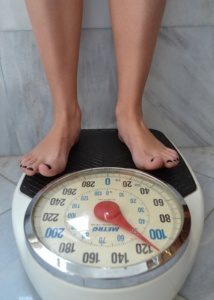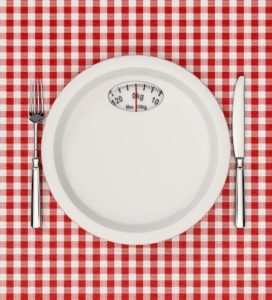Endometriosis and Weight Gain: Understanding the Connection
The fear of weight gain due to endometriosis is a concern shared by many women. Some even claim to have experienced weight fluctuations or increased body weight post-diagnosis. This prompts the question: What is the connection between endometriosis and body weight?
Endometriosis and Body Weight: Unveiling the Impact on Slim Women
A noteworthy discovery from various extensive studies indicates that endometriosis tends to affect predominantly slim women. [1]. However, it is essential to clarify that no evidence suggests that low body weight causes endometriosis, nor does obesity act as a remedy or preventative measure [2]. The intriguing aspect is why women with underweight to average weight profiles are statistically more susceptible to endometriosis than their overweight or obese counterparts. Despite this correlation, the precise underlying mechanisms remain unclear.
The Relationship Between Endometriosis and Weight Gain: Unraveling Misconceptions
Contrary to popular belief, there is no substantial connection between endometriosis and weight gain [3]. Despite this, many individuals who grapple with endometriosis often mention experiencing weight gain, particularly after their diagnosis. In light of this, we aim to shed light on potential reasons why some women associate endometriosis with weight gain and share their experiences of gaining weight. It is essential to clarify that these reasons are not directly linked to endometriosis but hold an indirect relationship. Some of these aspects may resonate with your circumstances.
Impact of Hormone Preparations
Some hormone preparations employed in endometriosis therapy have the potential to contribute to weight gain. These preparations encompass medications like danazol (danatrol, danocrine) and progestins, including medroxyprogesterone acetate and medroxyprogesterone. Suppose you suspect these medications might be attributed to weight gain and have systematically excluded other potential factors. In that case, it is recommended to consult your doctor before discontinuing the preparations independently.
Potential Side Effects of Other Medications
Endometriosis frequently coexists with additional health concerns necessitating medication. This encompasses antidepressants and other pharmaceuticals to address psychological issues commonly coinciding with endometriosis. Should you suspect that any of these medications might be influencing weight gain, engaging in a dialogue with your doctor before contemplating any modifications to your current regimen is imperative.
Water Retention
The term “weight gain” does not exclusively equate to increased body fat, as it can also encompass water retention, leading to a notable surge on the scale.
Deciphering whether those additional kilograms stem from fat, water, or muscle requires a comprehensive assessment through long-term and regular Bio-Impedance Analysis (BIA) measurements. Water retention can be attributed to unhealthy dietary habits (excessive alcohol, sugary, or salty intake), specific medications, cardiac issues, or even climatic shifts (hot and humid conditions). Furthermore, the menstrual cycle inherently induces fluctuations in water retention. If your weight exhibits significant and rapid changes over brief periods, water retention rather than fat accumulation is the likelier culprit. This phenomenon is a regular occurrence due to the menstrual cycle and should be considered entirely normal.
Altered lifestyle
Endometriosis can significantly disrupt an active life and curtail participation in certain physical activities. [1] The presence of pain, excessive bleeding and digestive issues often necessitates the scaling down or complete abandonment of strenuous pursuits like biking, hiking, sports club engagements, and more. Even routine physical activities take a hit as comfort and convenience often impact the choice of driving over walking or cycling, especially when endometriosis symptoms are prominent. Consequently, a decline in overall physical activity ensues, leading to a subsequent reduction in energy requirements. Should dietary adjustments not accompany these lifestyle changes, weight gain becomes a potential outcome. It is prudent to reevaluate your nutritional habits. Do they remain in harmony with your present level of physical activity? If you perceive a decrease in your movement compared to the past, it is worth exploring how to counteract this. Perhaps consider adopting a sport for better days and incorporating lighter exercises like yoga or walking for days when symptoms are more challenging. Engaging in physical activity also offers the added benefit of enhancing your mood!
Nourishing the Soul
Undoubtedly, sinking into the sofa with a delectable pizza can offer solace. Culinary exploits might not be your foremost consideration when grappling with pain, correct? Paring this with a “nice glass of wine” or a “refreshing beer” transforms TV time into an ideal haven. It is natural to seek comfort in “indulgence” after a taxing day, finding solace in soulful foods, unwinding with alcoholic beverages, or bestowing “self-care” through treats. These classic routines tend to emerge amid physical (and psychological) strains. It is a well-known reality that indulging in such “little things” and occasional “slips” can inadvertently contribute to weight gain. This phenomenon is far from novel. Do you occasionally find elements of yourself resonating with these behavioral tendencies?
Crash Diets
Amidst weight fluctuations, many women resort to drastic measures like crash diets, unwittingly locking themselves into an unending cycle of weight oscillation – colloquially called the “yo-yo effect.” The premise of crash diets entails a primary loss of muscle mass and water, the latter being tied to the glycogen stored in muscles and the liver. This initial plunge on the scale is inevitably followed by a swift rebound post the crash diet phase.
The recurrence of weight gain emerges due to reverting to a similar dietary pattern as before the crash diet. Unfortunately, owing to diminished muscle mass, the energy intake becomes disproportionately excessive compared to pre-crash diet levels. Consequently, crash diets fall short of sustainable long-term weight loss methods. Paradoxically, they frequently result in subsequent body weight increases.
Endometriosis does not directly cause weight gain. However, its diagnosis can create situations that might influence the scale, though not always. Qualified nutritional counseling can guide you in preventing weight gain and achieving healthy, sustainable weight loss.
References
- Finding the Perfect Nutritionist: A Step-by-Step Guide - 5. October 2023
- Does Monk’s Pepper Help with Endometriosis? - 5. October 2023
- A Brief Overview of Dietary Fats - 29. September 2023








